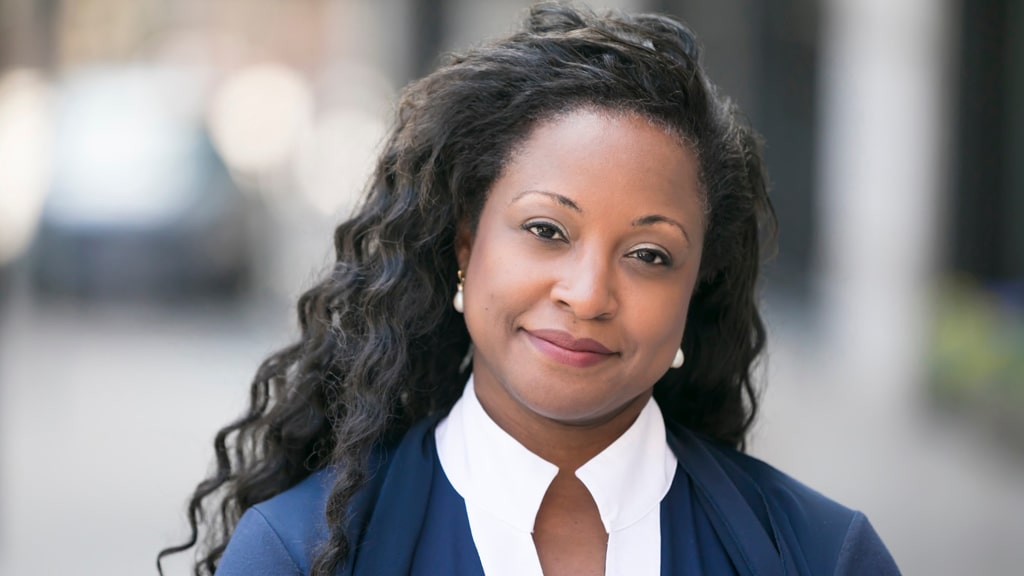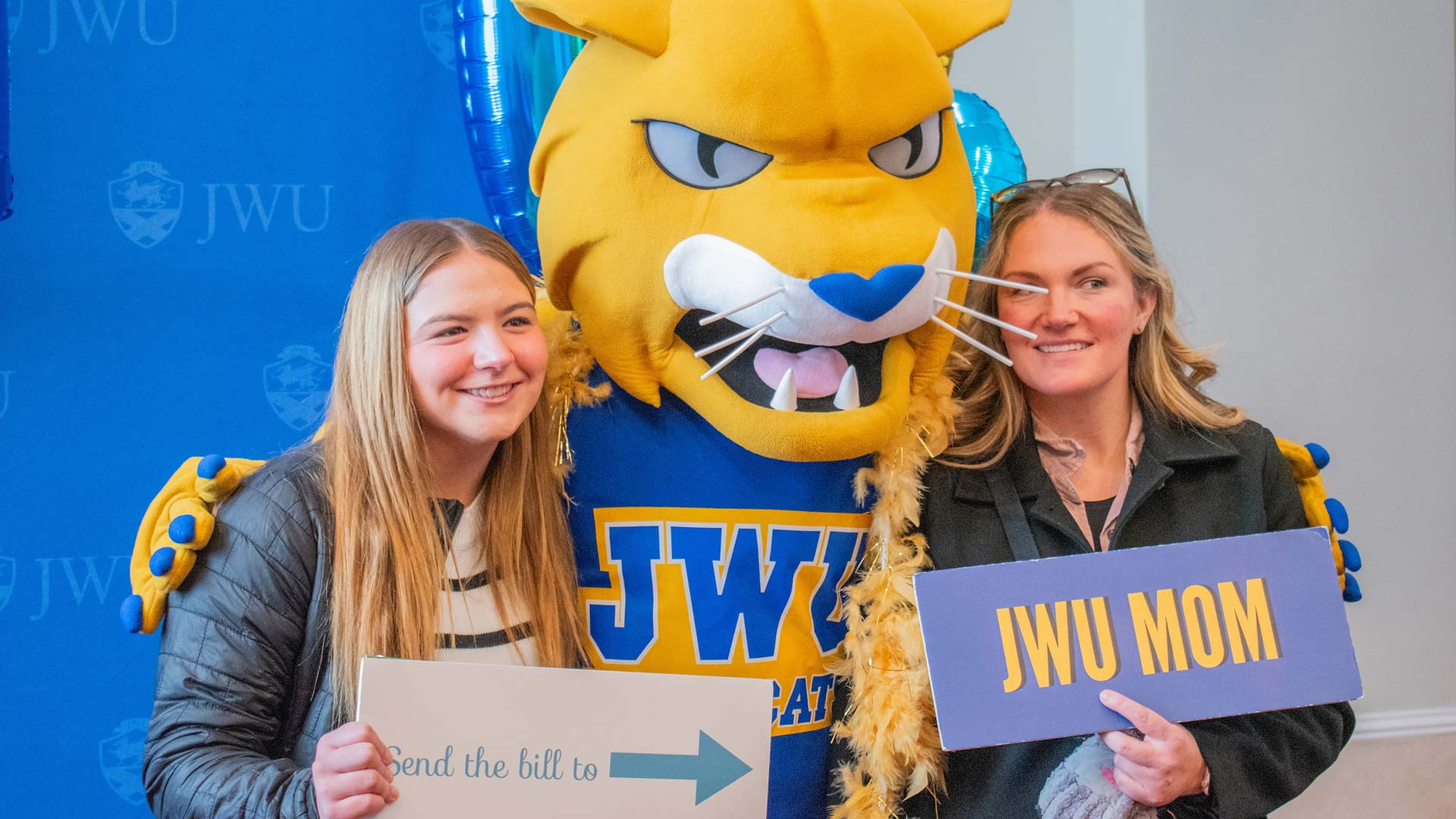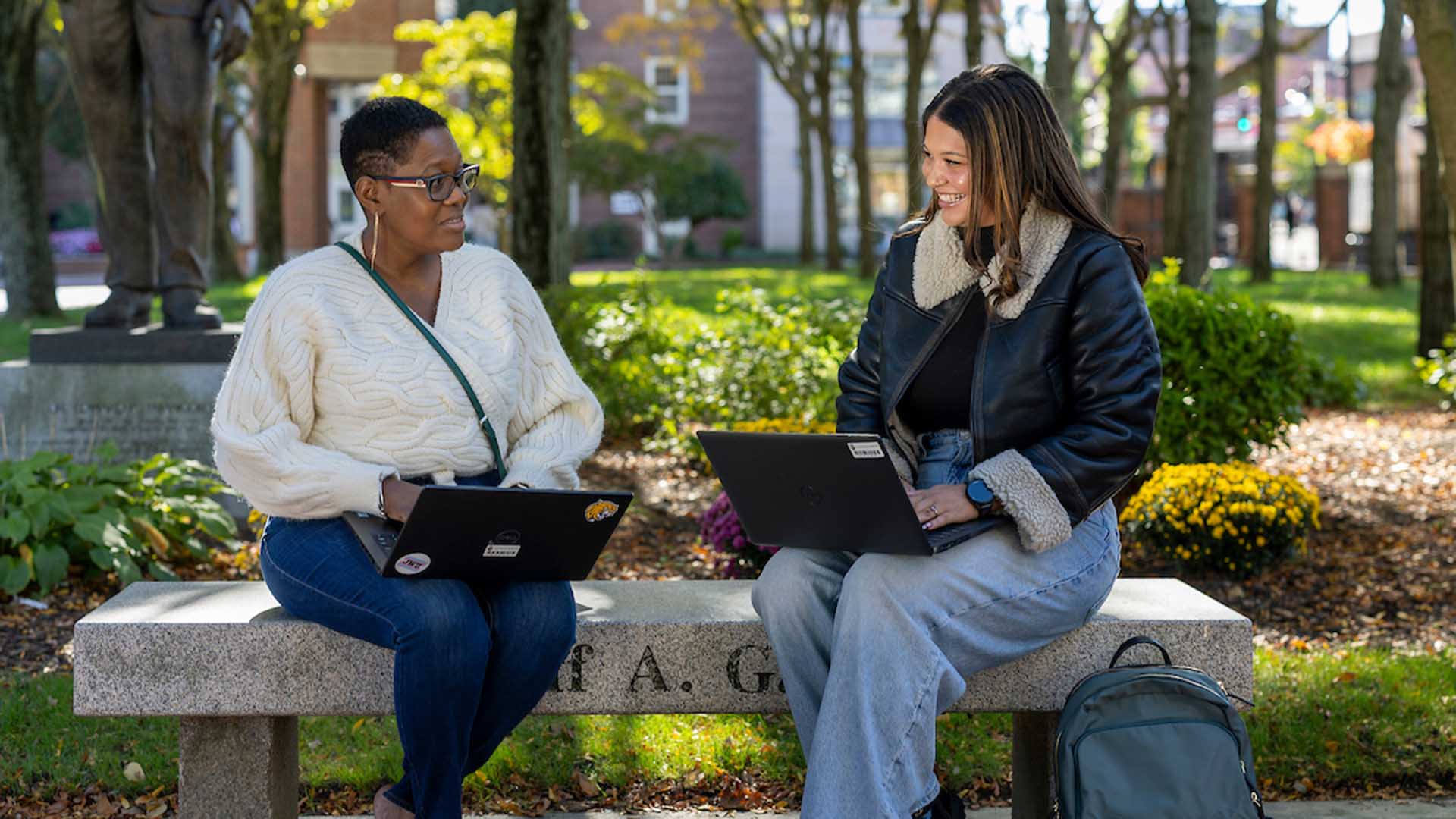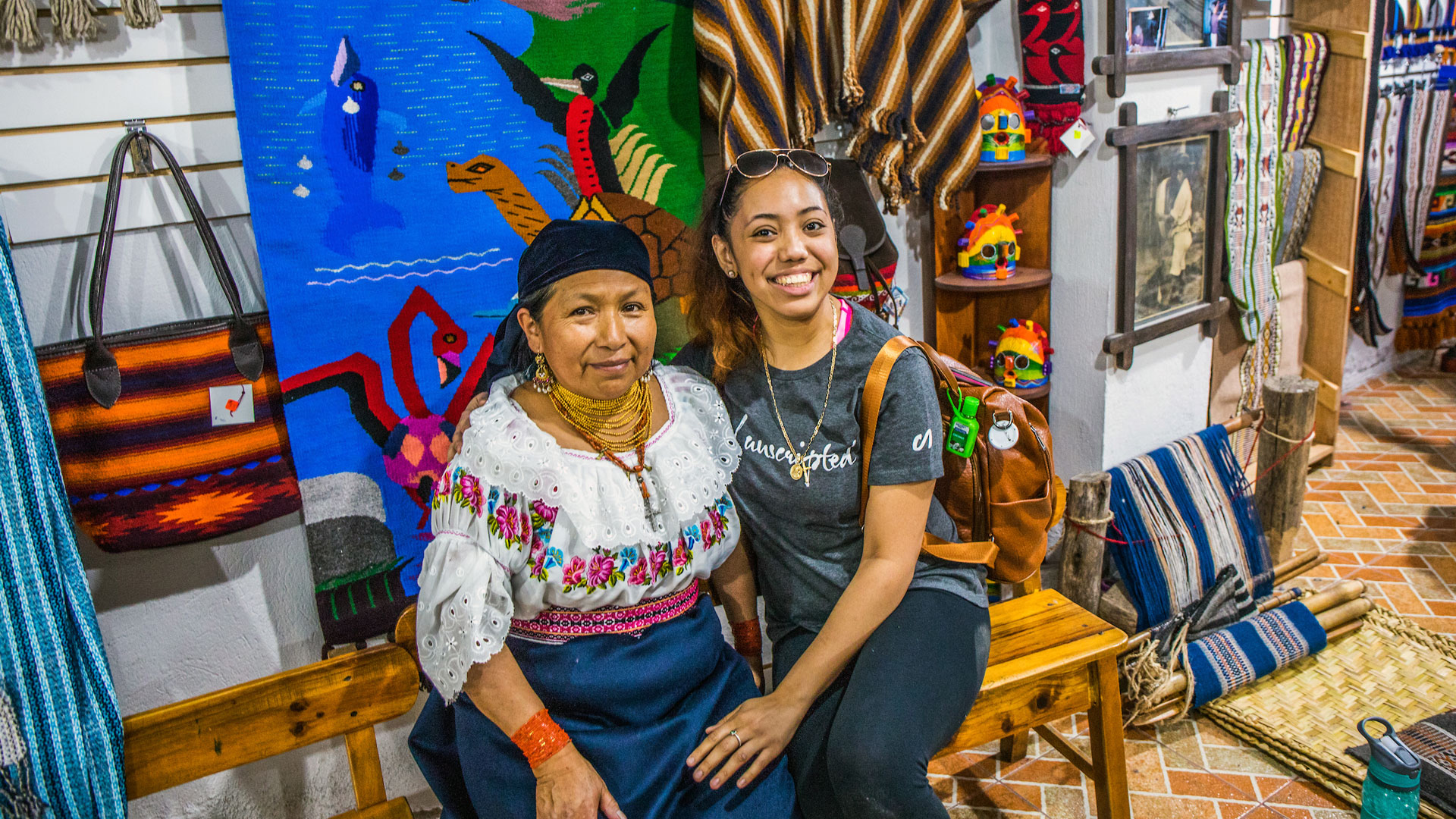A Conversation with Kamilah A'Vant, JWU 2020 Visiting Industry Professional
 In November 2020, Johnson & Wales University welcomed Kamilah A’Vant as the 2020 Visiting Industry Professional. A’Vant is the Director of Diversity Programs for Color Magazine, which celebrates corporate America’s diverse workforce and empowers communities. She is president for the New England chapter of the National Association for Multi-ethnicity in Communications (NAMIC), a member of the Southern New England Association of Black Journalists, a community advisory board member for the “Reflection in Action” program at Harvard Medical School Office of Diversity Inclusion & Community Partnership, and a board member of the Children’s Friend.
In November 2020, Johnson & Wales University welcomed Kamilah A’Vant as the 2020 Visiting Industry Professional. A’Vant is the Director of Diversity Programs for Color Magazine, which celebrates corporate America’s diverse workforce and empowers communities. She is president for the New England chapter of the National Association for Multi-ethnicity in Communications (NAMIC), a member of the Southern New England Association of Black Journalists, a community advisory board member for the “Reflection in Action” program at Harvard Medical School Office of Diversity Inclusion & Community Partnership, and a board member of the Children’s Friend.
At the end of the virtual event, A’Vant took questions from the audience but due to time constraints, some were unanswered. Here’s a sampling of those questions and her responses.
Below you’ll also find a recording of A’Vant’s presentation.
What are some ways for people to advance in their career without necessarily managing others? There are numerous ways to manage with influence and not have to have a large number of staff reporting directly to you (however, note that often managing teams is crucial for advancement to senior level positions). I am a big champion of entrepreneurship. As a leader and primary strategist of your own brand/product there is a great deal of autonomy and personal control as to how you want to advance in your company. Regardless, a leader will need to have a strong leadership team around them to execute business plans and ensure all functions operate effectively. Bringing on skilled individuals in key positions to delegate and manage operations/personnel, such as an HR leader, is a good way to progress and drive personal and company performance forward.
In today's climate, as a minority, how can one navigate in the workplace in feeling safe to be your authentic self as an innovator and leader without compromising upward mobility?
This is a challenge. It is critical to understand the place where you work. If a diverse employee is not in an environment where there is a community or supportive system it is likely there will be biases or systems in place to hamper innovation and mobility. Diversity blooms in an environment that welcomes and serves as an incubator for an array of thought, expression and perspectives. I would first suggest finding allies and/or those people where you share commonalities. Build a support system with others that encourages/supports a workplace that focuses on belonging. If you cannot find it internally, then I would suggest channeling efforts to get a support system outside of where you work.
How do you stay motivated when you apply for jobs and you are required to participate in 3-4 interviews (including Zoom interviews) and companies don't call you about the position?
I have been in this position many times. First, be diligent when applying for positions making sure your skills align with the job description. Customize personal skills to match what the job requirements are in the posting. It is important not to send the same résumé for every job position. If you possess transferable skills that can apply to a new role for you, highlight that in the cover letter. Perhaps work you’ve done in an internship or senior project can highlight the skills you’ll need for the position.
I think preparation helps best when it comes to interviews. Normally it is okay to ask who you will be interviewing with in advance. Do your homework, look that person up and learn more about them (for example check out their LinkedIn profile), learn a lot about the company, research what new products or campaigns they are working on. Also, network, network and network! Most professionals get their next opportunity because of someone they know — either giving them a heads up of a new job opening or working to make sure they get connected to someone who can get them in front of a hiring manager.
Ultimately, you need to emphasize why you are the best candidate for the job. Also, try to see big picture — if you truly believe you are overlooked for a position because of the color of your skin, sometimes, it is necessary to view it to be a positive thing you were not selected. Better to be overlooked/denied a role at a company that is not a good fit, than getting the job and finding yourself in an environment where you feel like an outsider.
What would you suggest for business professionals, specifically in the Diversity & Inclusion space, to help move the needle on internal initiatives at their organization?
Understand where your company is on its Diversity & Inclusion journey. It can be challenging trying to move the needle on internal initiatives if that is not where the company is going. Find internal allies in senior leadership that are interested in making diversity a priority, build a relationship with them and ask them to champion new or existing initiatives. Use existing channels, for example Employee Resource Groups, to drive momentum around the importance of diversity and inclusion. D&I business professionals need their own network among D&I leaders so connect with others doing similar roles in different industries, share best practices and learn from one another.
What got you into wanting to seek inclusion for those who are often excluded?
I didn’t initially wake up and say this was what I wanted to do. I think it was an evolution as to my experiences and seeing a void in the area where I worked. As it became more apparent (and as I got older), I think I realized that instead of complaining about the situation I needed to join organizations or work with people who could make a change. I think we all need to be personal champion for change, even if it is just for us — in the event there can be a ripple effect and others will benefit.
What is more important, focusing on diversity or focusing on inclusion?
There is mixed thought on this question, and belief that focusing on inclusion would alleviate all of the problems associated with diversity, while actually driving companies toward greater diversity. That focusing on similarities can decrease the discomfort and tension between people, and it can debunk stereotypes. Additionally, being inclusive is believed to be beneficial to everyone, and should be seen as a win-win situation: making someone feel more included is not going to detract from anyone else’s experience. It is my belief it is imperative for both diversity and inclusion to work hand in hand — one is not more important than the other.
How can someone whose degree isn’t specifically in communications use their degree to enter the workforce in communications fields like news writing and broadcasting?
You do not have to have a degree in communications to work in broadcasting. My undergrad degree is in Economics and master’s in Business. Many jobs in communications want someone with a degree, that you can write effectively, are a good researcher, and have an eye for detail — just to name some desired skills. For example, someone with a degree in political science can work in communications as a political analyst — think of all those whom we watched almost non-stop during the election explaining the state races and election numbers. There are numerous trade website, blogs, journals and publications that need writers who have knowledge of specific topics as well.
You previously mentioned that you're a natural introvert. Do you feel as though this has held you back as a woman of color in your professional industry of work?
I do feel there were times earlier in my career when I could’ve done better advocating for myself and there would have been better or more rewarding outcomes. I believe being an introvert along with being a woman made me less likely to take risks, which can hamper anyone, regardless of skin color.
However, I think ultimately things work out for the good and although in my journey it took me a while to find my own voice and path, I’m moving in areas now where I am meant to be.
How has Covid-19 impacted student involvement with NAMIC?
NAMIC has been affected just as many event-based businesses have due to Covid-19. Primarily our ability to hold in-person programming which serves as opportunities for students to network and engage with industry professionals. Often NAMIC uses volunteers to work our events which gives students a chance to talk with media professionals, or work on committees that create event programming where students can gain experience and direct contact with media companies.
Because of Covid-19, we can't visit our professors in person. How do you suggest we develop a mentor/mentee relationship
I strongly suggest you continue to engage your professors via digital media platforms. Set up a LinkedIn page and connect with past professors, once you connect with them take a look at their connections and if you see someone you would like to meet ask for an introduction. Also, because everyone is more engaged on social media platforms, use this time as an opportunity to join meetups/student professional groups and other organizations now working to connect with people in the virtual space. There are many free webinar events going on in all areas, check some out and if there are people you’re interested in speaking in that space, sign up. Many panelists want to connect with the audience that’s the main reason why they participate.
Looking back, what qualities and characteristics have you adopted from your mentor(s)?
- Be on time. For many leaders, time is a valuable commodity and if you set up a meeting with a mentor, or anyone else, it is important for you to be prompt and respectful of people’s time.
- Don’t be reactive. There will be times when you want to fire off an email because you are worked up, but it is always important to take a breath, even walk away, go back and re-read it before hitting send.
- Set up your own personal Board of Directors made up of friends, associates and others whose opinion you respect. Use them as a sounding board when you need advice, a shoulder to cry on or to tap their knowledge/network.
- Trust your gut or conscience. Often there are cues that surround you about whether or not to proceed/or to proceed on a specific thing. It is good to explore those possibilities and give yourself a backup plan (worst case scenario) if you find yourself facing a challenge or failure.
What are some challenges that you have experienced, and how did you get through them?
I lost my job for over 14 months when I worked in television and the company was bought by a competitor based in Texas. The job market was really tight and it was difficult to find a similar role in my area. I faced a number of job rejections often hearing I was ‘overqualified.’ I realized I needed to reinvent myself and start looking at things to do for the ‘now’ until what I wanted opened up. A connection of mine suggested a part-time role as adjunct professor since I met all the qualifications (I had never taught before), she directed me to the hiring professional, I applied and started. Not only did it help supplement my income for a short while, but it also opened up a new experience for me that I now value.
During that time I also took a role at a local bank, again a connection I knew for years when I was a paralegal reached out knowing I was job hunting. It was not a position I really liked, but it provided income and gave me opportunities to network in a new industry while I continued my job search.
Overcoming challenges is hard and can be emotionally draining. I think if there are people who are genuine and say ‘what can I do to help?’ you should reach out to them, don’t be too proud to admit you need it. For me, being flexible and open to new opportunities lead to new skills and as a lifetime learner I think it helps going forward.
Working in mass media, a major socialization agent in our culture, how do you use your position to educate and create a more diverse and inclusive culture?
Luckily, I work with and am involved with brands/organizations which have missions specifically focused on educating, empowering and promoting a more diverse and inclusive culture. I collaborate with partners with similar focus and values so there is not as much stress trying to convince others to buy in. With all the organizations I work with, in addition to my current role, we purposely create programming that advocate for diversity and inclusion. I use my position to be an ambassador for the organizations’ work, speaking on the need and value of a more diverse culture and ways others can get involved to move the diversity, inclusion and equity needle.
What advice do you have for people, especially women, of color who feel like they have to ‘fight for their place’ at work?
I find myself often feeling that way. However, I also realize that often I earned that place so [I ask myself] ‘how can I do my best while in the role I’m in to make a difference?’ More importantly, ‘is there a way to encourage or be a gateway for others that look like me to get in the company?’ I try to be an influencer from within.
What inspired you to start working in the media industry?
My path to the media industry was by chance. I was a corporate litigation paralegal for six years for a large Fortune 500 company. I was burned out and the company was undergoing serious financial challenges. I thought it would be smart to start checking out the job market before I was let go and saw a position posted in a RI Bar Association classified site. I thought it would be a longshot as I had no television experience. I was contacted for an interview because the hiring manager believed I had the transferable skills as a paralegal to execute the duties which were more on a business nature of working with media contracts. Once I began to see the work behind television, that’s when I began to view media as an area that I wanted to expand my career.
An alumnus attending the event asked: How did you work towards rebuilding self-esteem when you felt overlooked in the work place?
It was hard. I think I leaned on those who I knew could give me honest feedback. You want to have people around you that will support you but also tell you the truth. I had so many people look at my résumé to give me suggestions for improvement. I found a mentor, connected with those who I respected and knew my worth. Together we worked on a plan which focused on how to highlight my strengths to take on higher profile assignments at work so others could see what I was working on and my desire to get things done. This plan can be transferred to any industry and should be revised routinely.
What advice can you give to someone that has been in the same company for more than a decade and has realized that in order to move up they have to leave.
Realizing you need to leave is the first and most important step. Given this time of change (in 2020,) many companies will realize there are outside forces that can influence a person’s need to shift careers. I think it is important to highlight how the skills/experiences that you developed in the role you are leaving (want to leave) are of value to the role you are seeking. What you can bring to the table? How can this company benefit from all that you know?
Can you speak to the best way for a student to get their résumé and themselves out into the workforce?
Start with your career services and use JWU alumni network first. They have all the tools and staff needed to get you going.
If you don’t have a LinkedIn page, start one and build connections with professors, anyone you connected with doing internships, volunteering, friends who graduated and are working and family.
What's your advice on standing out in the work environment?
In addition to working hard and doing your job to the best of your ability:
- volunteer to take the lead on projects (even if you are not sure what you’re doing)
- if you have a good creative idea speak up;
- encourage others around you — be a team builder;
- take risks/say yes if someone offers you a new opportunity — again even if you don’t have a clue on next steps. If you fail you will learn from the experience and it gets you accustomed to challenging yourself.
Do you have any book, show, or film recommendations?
Books:
“How to Be an Antiracist,” by Ibram X. Kendi
“White Fragility: Why It’s So Hard for White People to Talk About Racism,” by Robin DiAngelo, Ph.D.
“What Unites Us: Reflections on Patriotism,” by Dan Rather and Elliot Kirschner
“Becoming,” by Michelle Obama
“The Fire Next Time,” by James Baldwin
“I Am Malala: The Girl Who Stood Up for Education and was Shot by the Taliban,” by Malala Yousafzai
Films:
“The Birth of a Nation”
“To Kill a Mockingbird”
“When They See Us”
HEADSHOT PHOTO CREDIT: CHRISTOPHER HUAN PHOTOGRAPHY. BELOW: WATCH THE CONVERSATION BETWEEN JWU’S SHERI YOUNG (LEFT) AND AVANT (RIGHT).



